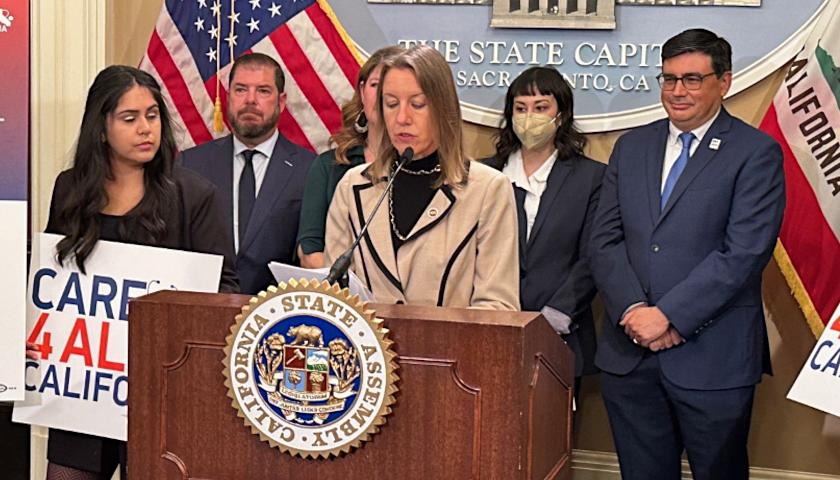A bill to allow assisted suicide via a lethal dose of drugs after approval from two doctors is before Connecticut state lawmakers again, despite its failure in the legislature for years.
Senate Bill 88 would require candidates for assisted suicide to be at least 18 years old and diagnosed with a terminal illness, with a prediction of less than six months to live.
Individuals would need to make their case for assisted suicide to two medical professionals for approval, which could take several weeks prior to receiving the lethal drugs.
The Public Health Committee heard public comments Wednesday on the legislation.
“My primary desire to access medical aid in dying is not depression, I am not suicidal,” Herbert Hoffman, a cancer patient who supports the bill, said, according to NBC Connecticut.
Hoffman’s daughter reportedly died five weeks ago.
“I have seen the devastating progression of cancer up close and I am very aware of what is ahead of me,” he added. “I want my freedom to end my life when and how I choose.”
State Representative Mark Anderson (R-Barkhamsted) (pictured above), however, opposes “any and all potential legislation to allow doctor assisted suicide, he noted at his website.
“S.B. No. 88 seems to be missing a provision that was in last year’s bill, one that I believe is the law in the few states and D.C. that permit this practice,” Anderson wrote, adding:
That provision is that the cause of death be listed as the underlying disease, not suicide. Should this become the practice, that would be a lie codified into law. In Connecticut, is it to be left to the medical examiner to decipher without guidance of law or will that be added to this bill? It seems that cause of death instructions need to be provided for.
Anderson also shared he lost his first wife to cancer. When she was diagnosed, she was already at stage 4, and was given three months to live.
“But thanks to a great physician and aggressive treatment, she lived three years,” the Connecticut representative said. “During those three years, there were many precious family times with our two sons, as well as marital reconciliation. This was priceless. A doctor does not know when someone has less than six months to live. It is a guess.”
Lying on death certificates? Sure! SB88 would lead to more misery and criminal mischief. https://t.co/mCmsvq8ufV
— Family Institute CT (@FICAction) February 23, 2022
The bill is euphemistically titled “Aid in Dying for Terminally Ill Patients,” wrote Leslie Wolfgang last week at Family Institute of Connecticut, which opposes the bill.
Wolfgang observed that, at the Public Health Committee’s public hearing, supporters of the legislation appeared to be overwhelmed by the number of individuals who oppose it.
Liz Gustafson, state director for abortion lobbying group NARAL Pro-Choice Connecticut, for example, is promoting the legislation, Wolfgang noted:
Nobody will be surprised that Ms. Gustafson is the State Director of ProChoice Connecticut, which asserts it is “Connecticut’s leading political advocate for reproductive freedom.” And although, abortion is its main gig, it also realizes that they lose support among the majority who oppose abortion for any reason when they are honest, so “reproductive freedom” it is! But, euphemisms abound, because they also support “aid in dying”. If you follow politics in CT or this blog, you know that “aid in dying” is the phrase now even the Connecticut media uses to describe “assisted suicide” … “Assisted suicide” is the term used by the state statutes. In fact, a Connecticut Superior Court determined that “Medical Aid in Dying” was just “assisted suicide” by another name. Blick v. Off. of Div. of Crim. 2010 Ct. Sup. 11992 (Conn. Super. Ct. 2010).
Connecticut lawmakers have drafted assisted suicide bills numerous times in the last 30 years, but have never succeeded in passing the legislation. In 2021, a bill was passed out of committee for the first time, and supporters of the measure are hoping they now have momentum.
“An aid in dying law, even with one that leaves out so many people who will not qualify, is a long needed, tiny step toward civilization,” said Tessa Marquis, a Milford resident, according to Connecticut Public Radio.
Lisa Blumberg: Medically assisted suicide: It’s not that simple https://t.co/FCzL3Hekcy
— Family Institute CT (@FICAction) February 28, 2022
But Lisa Blumberg, a Connecticut writer, attorney, and disability rights activist, wrote in an op-ed at the Hartford Courant Friday that while proponents of the legislation tout the measure as a beacon of “choice and control to dying patients,” in fact, “it’s not that simple.”
Blumberg explained a glaring problem:
First, there is no magic pill for a gentle death. No assisted suicide law gives doctor guidance on what a drug prescription to end life should contain. In Oregon, it has sometimes taken people up to 72 hours to die. With doctors free to devise a cocktail involving multiple drugs and desiring to keep cost down, side effects like burned mouths or seizures can occur. Terry Law, a frequently active assisted suicide doctor, said, “There’s lots of data on stuff that helps people live longer, but there’s very little data on how to kill people.” The focus of the FDA is, of course, to minimize drug toxicity, not maximize it.
Blumberg’s discussion of the “implicit bias” of physicians led to a mention of a recent study, published at Health Affairs, of doctors’ views of disabled individuals.
Researchers found, of 714 practicing physicians nationwide, 82.4 percent reported the perception that individuals with a serious disability have a worse quality of life than nondisabled people.
“Only 40.7 percent of physicians were very confident about their ability to provide the same quality of care to patients with disability, just 56.5 percent strongly agreed that they welcomed patients with disability into their practices, and 18.1 percent strongly agreed that the health care system often treats these patients unfairly,” the authors of the study observed.
“[T]hese findings about physicians’ perceptions of this population raise questions about ensuring equitable care to people with disability,” the researchers concluded. “Potentially biased views among physicians could contribute to persistent health care disparities affecting people with disability.”
As Blumberg noted as well, the requirement placed upon the terminally ill person to receive approval from two doctors should be viewed in light of the fact that medical judgments of this nature are frequently incorrect.
According to a study published at the National Institutes of Health (NIH) in 2014, 12-15 percent of hospice patients live beyond their prognosis of six months until death.
“The message behind assisted suicide laws is that it is reasonable for a certain subclass of people to want death hastened based on their health and disability,” Blumberg concluded. “But a just community cannot make death the default option.”
– – –
Susan Berry, PhD, is national education editor at The Star News Network. Email tips to [email protected].
Photo “Mark Anderson” by State Representative Mark Anderson. Background Photo “Clinicians in Intensive Care Unit” by Calleamanecer. CC BY-SA 3.0.









[…] the end of life or the beginning of life,” she observed, referring to both the assisted suicide bill currently making its way through the state legislature, and the fact that Connecticut is one of the […]